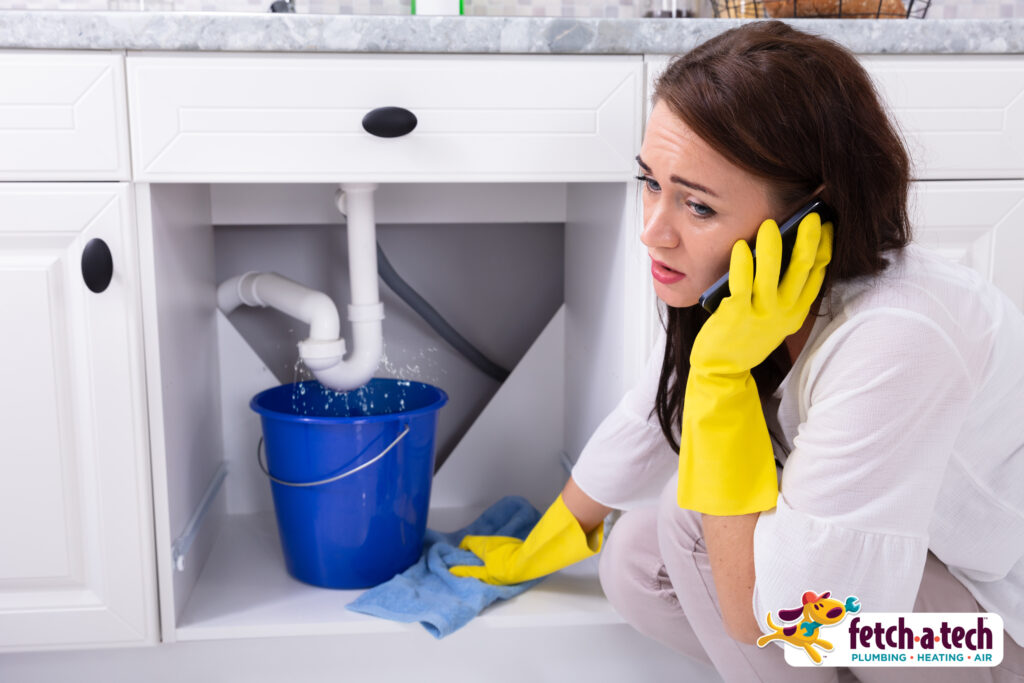
Plumbing problems can be a nightmare for homeowners. A leaking faucet, clogged drain, or burst pipe can disrupt your daily life, cause water damage in your home, and lead to expensive emergency repairs.
Fortunately, many common plumbing issues can be prevented with some proactive measures and regular maintenance. If you’re wondering “how can I prevent plumbing problems?” say farewell to plumbing issues with this helpful guide from the experts at Fetch-A-Tech.
Regular Plumbing Maintenance
Like any other system, yourplumbingshould have regular maintenance to ensure everything is working properly and catch minor issues as they arise. Just like you would service a car to keep it running smoothly, your plumbing system requires regular attention.
Here are some common tasks involved in plumbing maintenance:
Checking for leaks:A small drip from a faucet may not seem like a big deal, but it can add up to a significant amount of water wastage over time. Inspecting the faucets, showerheads, and pipes in your home can help you identify leaks and get them fixed before they become a problem.
Inspecting for water pressure:High water pressure is a good feeling in the shower, but it can add strain to your plumbing pipes. Over time, this can cause leaks and damage. Invest in a pressure gauge to measure the water pressure in your home. It should be between 40 and 60 psi. If it’s higher, consider installing a pressure regulator to prevent stress on your pipes.
Cleaning drains regularly:Cloggeddrains are a common plumbing problem. Prevent them by cleaning your drains regularly with a mixture of hot water, vinegar, and baking soda. This is a safe and natural way to dissolve build-up and prevent blockages.
Insulating pipes:Frozen pipes are an issue during extremely cold weather. If you have pipes in unheated areas of your home, such as basements, attics, and crawl spaces, it may be worthwhile to insulate them. Though Las Vegas and the surrounding areas don’t often get cold enough to freeze pipes, this small measure doesn’t hurt.
Flushing the water heater:Sediment can accumulate in your water heater over time, reducing its efficiency and potentially causing damage. Regularly flush your water heater to remove this sediment and extend its lifespan.
Properly Disposing of Foreign Materials.
What you put into your drains can significantly impact your plumbing system. Some items should never be flushed or poured down the drain, including:
Grease and oil:Pouring grease and oil down the drain may seem convenient, but it only flows freely when it’s hot. Once it cools, it can solidify in the pipes and lead to clogs. Instead, collect grease and oil in a container and dispose of it in the trash.
Food scraps:If you have a garbage disposal unit, keep in mind that it’s not designed to take on all types of food. Disposing of fibrous vegetables, meat, animal bones, and other hard foods can damage the disposal blades and gum up the system. Limit the items in the disposal to small, soft food scraps.
Flushable wipes:A lot of products are marketed as flushable, but they’re really not. Flushable wipes and feminine hygiene products, for example, do not break down as easily as toilet paper. Flushing them can lead to blockages in your sewer system – and an expensive bill.
Chemical drain cleaners:Chemical drain cleaners may seem like the ideal fix for clogs, but they can damage your pipes and lead to bigger problems in the future. They’re also harmful for the environment. Rely on natural methods like vinegar and baking soda to unclog your drains. For stubborn clogs, call a plumber.
Be Mindful of What You Put in the Toilet
Toilets are not designed to flush just anything. The only things that should go in your toilet are human waste and toilet paper. Flushing sanitary products, cotton balls, dental floss, and other objects can lead to blockages. Even using excess toilet paper can cause problems. Make sure you have a wastebasket in the bathroom to dispose of non-flushable items.
Use Drain Screens
Preventing clogs and plumbing problems is much better than fixing them once they happen. One of the easiest ways to prevent plumbing problems is by using drain screens or strainers. These simply devices can catch hair, food particles, and debris before they go down the drain and cause clogs.
Be Cautious with Chemicals
Chemicals have adverse effects on your plumbing system. If you’re facing a minor clog, try using a plunger or plumbing snake before resorting to chemical drain cleaners. As mentioned, drain cleaners can damage your pipes, especially if you use them all the time.
Monitor Your Water Usage
An unexpectedly high water bill can be a sign of a plumbing issue. If your water usage hasn’t changed, but your bill has increased, it’s essential to investigate the cause. A hidden leak can waste a significant amount of water and money. Regularly monitor your water bill to catch potential problems early.
Invest in a Water Softener
If you live in an area with hard water, consider investing in a water softener. Hard water contains high levels of minerals that can build up in your plumbing and appliances over time. Using a water softener can filter out these minerals, reduce buildup, and extend the life of your plumbing and appliances. It’ll also help your hair and skin stay healthier and keep your clothes in good condition.
Replace Washing Machine Hoses
The hoses that connect your washing machine to the water supply can deteriorate over time, leading to a big problem. Regularly inspect your washing machine hoses for signs of wear and replace them every few years to prevent potential leaks or bursts.
Educate Your Household
Preventing plumbing problems is a team effort. Speak to your family or household members about protecting your plumbing, such as what should and shouldn’t go down the drain, how to operate appliances correctly, what’s flushable, and what to do in the case of a plumbing emergency.
Pay Attention to What You Plant
If you have a garden, be mindful of where you plant trees and shrubs. Tree roots can infiltrate your plumbing system, causing blockages and damage. Consult with a professional landscaper or arborist to ensure that you plant trees and shrubs at a safe distance from your underground pipes.
Consider Pipe Insulation
Freezing pipes in Las Vegas and the surrounding areas are rare, but it can happen. If the temperatures drop below freezing for several nights in a row, it can lead to frozen pipes and an unpleasant, messy, and expensive burst. Worse yet, because it’s rare, many people are unprepared when it occurs.
Here’s how you can take precautions to avoid frozen pipes:
Insulated exposed pipes in unheated areas like attics, basements, and crawl spaces.
Keep faucets dripping when the temperature drops overnight. Allowing a slight drip can prevent water from freezing in the pipes.
Maintain adequate heating in your home during cold winters. This will help your pipes stay warm enough to prevent problems.
Ask your plumber if your pipes are at risk of freezing and whether they should be insulated, especially if you’ve experienced freezing pipes in the past.
Schedule Professional Inspections
Regular maintenance and prevention are vital, but make sure you have a professional plumber inspect your plumbing system periodically. This may be included in plumbing maintenance. Professionals can identify potential issues that you haven’t noticed and get them repaired before you have a major issue.
Address Problems Quickly
It’s easy to ignore small problems like a slow drain or signs of water damage. Small leaks and clogs can cause larger problems if you leave them be, however, and could indicate problems deeper in your plumbing system. If something is amiss, make sure you contact a professional plumber to repair them and avoid more extensive and priceyplumbing repairs in the future.
Upgrade Outdated Plumbing
Older plumbing systems are more likely to experience problems. While some piping can last decades, the fittings and other components may take more wear and tear. If your home has outdated plumbing, consider upgrading it to modern, more efficient materials. This not only prevents future problems but gives you the peace of mind of knowing your system is in good working order. This may also improve your home’s resale value.
Wait 10 Minutes Between Showers
If you have a large household, remind your family members to wait ten minutes between showers. Allowing those extra minutes in between will allow the slower drains the time they need to clear any debris, helping you to avoid a stubborn clog.
Take Proactive Measures to Prevent Plumbing Problems
Plumbing problems can disrupt your daily life. If your plumbing isn’t operating properly, you may deal with expensive repairs, a lot of wasted water, and expensive water bills. By following these preventative measures and practicing good plumbing habits, you can reduce the chances of having plumbing issues in your home.
In need of plumbing repair or maintenance?Contact usat Fetch-A-Tech to schedule your appointment!


